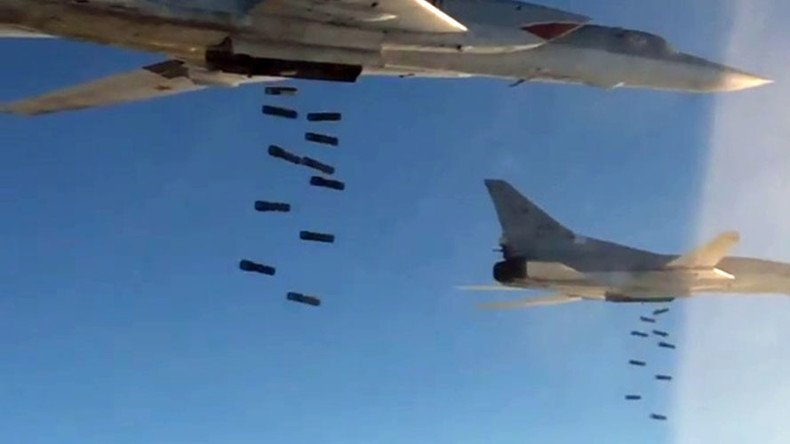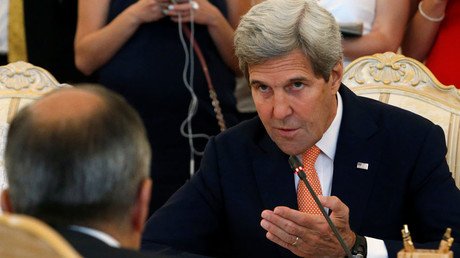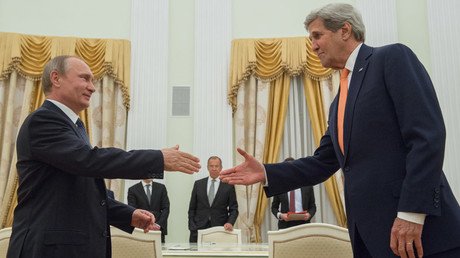Is Obama ‘offer’ for Russian cooperation in Syria too good to be true?

Nine months ago when Vladimir Putin ordered Russia’s anti-terror intervention in Syria, Barack Obama scorned the move, predicting it would lead to a disastrous quagmire. Why then is the US president so keen now to team up with Russia?
From dire predictions of Russian military failure in Syria to this week’s appeal by the Obama administration for cooperation “to defeat terrorists” in the Arab country, there is apparently a dramatic shift in US policy.
Gone is sanctimonious censure against Russia’s military intervention and forebodings about a Soviet-Afghan style quagmire in Syria. The public attitude of the US administration is now tantamount to the plea: Can we join your winning team in Syria, please?
US Secretary of State John Kerry flew into Moscow late Thursday and proceeded to have three hours of talks with Russian President Vladimir Putin, lasting into the early hours Friday.
Radio Free Europe reported that “Kerry sought to find new agreement with Russia on military operations in Syria”.
That’s quite a turnaround, given the heaps of vilification Washington has thrown at the Russian military operations, accusing Moscow of everything from “propping up the tyrannical Syrian regime of Bashar Al-Assad”, to bombing hospitals and civilians, to wiping out “moderate rebels”.
Throughout, despite the Western media disinformation campaign, the Kremlin has remained steadfast in its stated mission: To defend the sovereign state of Syria from an array of terror groups.
And quagmire this ain’t. Russia’s military forces, with relatively few losses, have transformed the five-year war in Syria, helping the Syrian army to put the illegally armed militants decisively on the defensive. Syrian state forces have recaptured huge swathes of territory, and the once seemingly formidable head-chopping jihadists and their so-called Caliphate are staring at defeat.
It may be too early to declare “mission accomplished” for Russia. But the situation on the ground certainly vindicates Putin’s strategy.
US media reports quote US officials as saying that the al-Qaeda-linked jihadists are telling their cadres that the Caliphate is on the brink of collapse. Significantly, too, this is also the context in which Turkey has shifted to a conciliatory position towards Russia and is even proffering a normalization of relations with Syria.
Washington and its regional allies, including Turkey, appear to be tacitly admitting that the covert military operation that they have been fueling for regime change in Syria is all but lost.
This is the context by which to read the latest “offer” from the Obama administration to Russia for military cooperation in Syria. After months of deprecating Russia’s intervention and stubbornly refusing to coordinate “anti-terror” efforts, Washington now appears to be reaching out to assist Russia.
Following the meeting between Putin and Kerry this week, the Kremlin said that “the topic of direct interaction between the Russian and US military in Syria was not discussed in detail”.
“They discussed different cooperation formats… but questions remain,” said Kremlin spokesman Dmitry Peskov. “We are not much closer to real cooperation in order to increase the effectiveness of efforts to combat terrorism in Syria.”
Ahead of Kerry’s trip to Moscow, the Washington Post leaked tantalizing details on “Obama’s Syria plan teams up American and Russian forces”.
According to administrations officials, Obama proposes the setting up of joint headquarters in Jordan, where American and Russian military would engage in “deep cooperation”.
The Post reports that “the participants should coordinate procedures to permit integrated operations” adding that “the administration spells out details about how it wants the United States and Russia to work together on the ground.”
‘I’m ready to work, I know you are – let’s go’ – #Kerry during meeting with #Putin in Moscow https://t.co/onrX1qBw5lpic.twitter.com/y49Xh7UD67
— RT (@RT_com) July 14, 2016
It all sounds like an ambitious and comradely joint venture that suddenly overturns months of American obstructionism towards Russia in Syria. Not only is it a tacit admission that Russia’s intervention has actually been effective in eliminating terror groups, there is also a hint as to Washington’s ulterior concern.
The Washington Post puts it like this: “In exchange for US assistance against [al Qaeda-linked] Jabhat al-Nusra, the Russian side would be required to limit airstrikes to targets both sides agreed on and also to ensure that the Syrian air force would stand down and not bomb targets in agreed-upon designated areas.”
Leaving aside the question about whether Russia really needs “US assistance” in pursuing its own very effective anti-terror operation, the giveaway condition being demanded by Washington is that it wants the Russian-Syrian offensive to be curtailed. And that is the issue.
Western media claims that terror groups like Nusra and Daesh [ISIS] are “embedded” with “moderate rebels” is a charade. The inference is that the “mingling” is an unfortunate accident, whenever in reality there is negligible distinction between most of the illegally armed groups.
What Washington wants therefore in its “offer for cooperation” is to insert some form of restraint over what is an otherwise successful Russian-Syrian anti-terror campaign – a campaign that has salvaged Syria from a foreign-backed covert war for regime change.
The other giveaway to Washington’s real agenda is the second condition for its “cooperation”. Radio Free Europe reports: “Washington also wants Russia to help start a political transition that would ultimately end the Assad family’s four-decade reign.”
In other words, Obama’s “Syria plan” is less about cooperating with Russia to “defeat terror groups” and all about inveigling Russia to assist unwittingly in its overarching strategic objective of regime change in Syria.
For observers with a clear grasp of the bigger picture of course the belated friendly overtures from Washington to Russia on Syria are disingenuous. The US and its regional allies have been sponsoring the terror front in Syria for the past five years. The American leopard cannot credibly change its spots overnight.
Moreover, only last week Obama was proclaiming to his NATO allies in Warsaw that Russia is a global threat alongside terror groups like Daesh. Now we are expected to believe that Obama wants to cooperate with Russia to defeat terrorism.
The unspoken game plan for Washington is to drive a split between Moscow and its longtime ally in Damascus.
Russia may be tempted to accept America’s purported “joint venture” in Syria as a way to normalize relations and to ease the US-led Western campaign to isolate Moscow internationally.
However, in doing so Russia would inevitably antagonize Syria. In an interview with US media outlet NBC this week, Syrian President Bashar al-Assad repeated his government’s position that US military operations in his country are illegal. The US, France, Britain and other NATO powers are bombing Syria without any legal mandate from the United Nations, regardless of their hollow claims of “combating terrorism”.
If Russia were to somehow engage with Obama’s offer of military cooperation in Syria that would lead to a rupture in the Moscow-Damascus alliance.
The real aim for Washington is not striking terrorists. How could it be given America’s bloodied hands in this dirty war? The real target is to thwart the winning side against terrorism in Syria, and to blow apart the Russian-Syrian alliance – which Washington calculates would lead eventually to regime change.
In a word: don’t buy it.
The statements, views and opinions expressed in this column are solely those of the author and do not necessarily represent those of RT.















